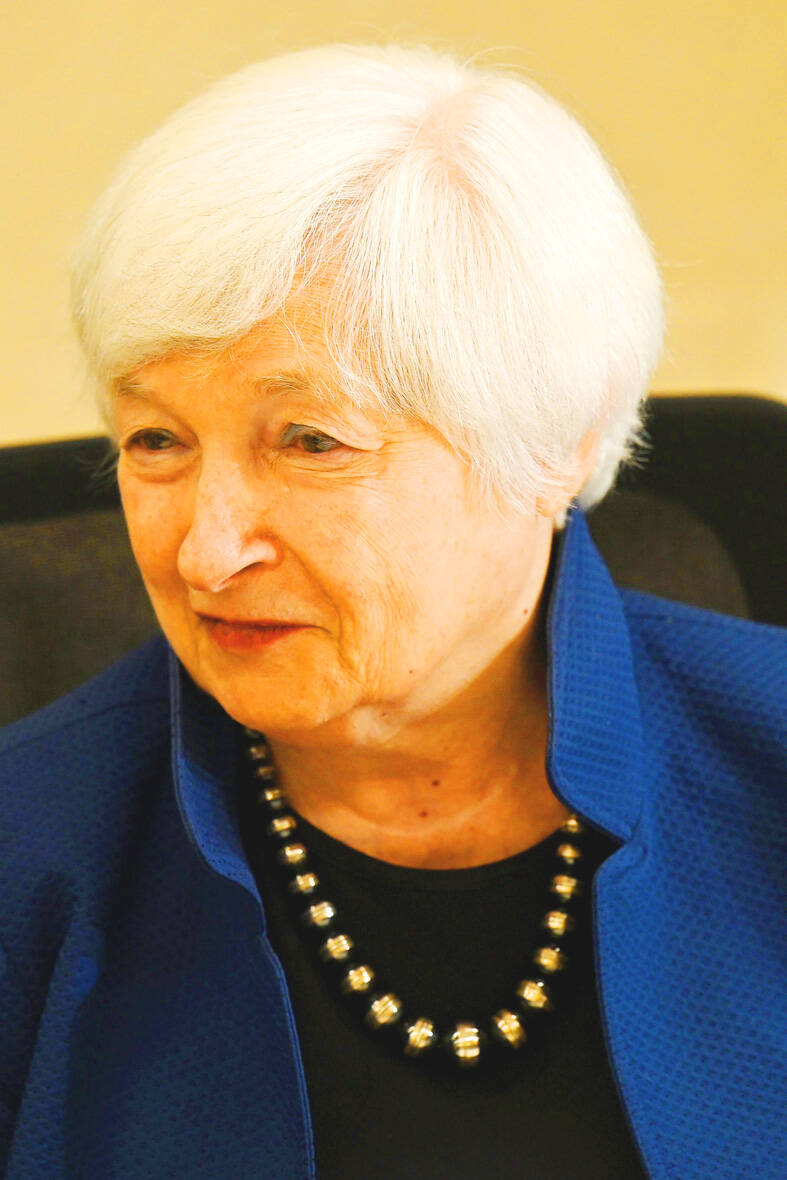US Secretary of the Treasury Janet Yellen plans to seek clarity from China on its plans to ease COVID-19 restrictions and deal with problems in its property sector when she meets with China’s central bank chief today, Treasury officials said yesterday.
It is important for top economic officials from the world’s two largest economies to discuss global challenges in person and learn more about each other’s policy plans, the officials told reporters in Bali ahead of a G20 summit.
Yellen is prepared to discuss with People’s Bank of China Governor Yi Gang (易綱) the outlook for US inflation and growth, but would likely leave monetary policy plans to the US Federal Reserve, the officials said.

Photo: AFP
The administration of US President Joe Biden has long raised concerns about the resilience of supply chains in China that have been hit by repeated COVID-19 lockdowns and growing national security restrictions.
In India last week, Yellen made a case for closer ties between the world’s two largest democracies, with India taking on a “friend-shoring” role as a trusted supplier and counterweight to China.
Yellen’s meeting with Yi comes on the same day that Biden is scheduled to meet with Chinese President Xi Jinping (習近平) in an effort to limit a recent downward spiral of the superpowers’ relations.
The officials said they do not plan to offer advice to China on its COVID-19 restrictions or its property sector woes, but rather seek to understand Chinese officials’ approach so they can better interpret the effects of policy changes.
China’s economy has grown 3 percent over the past three quarters and is stabilizing on an “upward trend,” Chinese Premier Li Keqiang (李克強) said, vowing to continue to support the economy with policy measures.
The comments were made in a meeting with IMF managing director Kristalina Georgieva on Saturday during an ASEAN summit in Cambodia, a Chinese foreign ministry statement said yesterday.
China is working to keep market operations, employment and prices stable, Li said in the statement.
“We will continue to promote the comprehensive implementation of a package of policies and measures for stabilizing the economy with full effect ... and strive to achieve better results throughout the year,” Li said.
Meanwhile, Georgieva warned of risks to the global economy from the rivalry between China and the US, while describing tariffs put on Chinese imports under former US president Donald Trump as counterproductive.
“We may be sleepwalking into a world that is poorer and less secure as a result,” Georgieva told the Washington Post in an interview published on Saturday.
Biden has yet to resolve the key policy issue surrounding tariffs on Chinese goods established by his predecessor that cost US importers billions of US dollars.
“It is important to think through actions and what they may generate as counter actions carefully, because once you let the genie out of the bottle, it’s hard to put it back in,” Georgieva said of the tariffs.
Relations between the world’s two largest economies have strained in recent years over issues like tariffs, Taiwan, intellectual property, cybersecurity and the removal of Hong Kong’s autonomy, among others.

South Korea’s equity benchmark yesterday crossed a new milestone just a month after surpassing the once-unthinkable 5,000 mark as surging global memory demand powers the country’s biggest chipmakers. The KOSPI advanced as much as 2.6 percent to a record 6,123, with Samsung Electronics Co and SK Hynix Inc each gaining more than 2 percent. With the benchmark now up 45 percent this year, South Korea’s stock market capitalization has also moved past France’s, following last month’s overtaking of Germany’s. Long overlooked by foreign funds, despite being undervalued, South Korean stocks have now emerged as clear winners in the global market. The so-called “artificial intelligence

NEW IDENTITY: Known for its software, India has expanded into hardware, with its semiconductor industry growing from US$38bn in 2023 to US$45bn to US$50bn India on Saturday inaugurated its first semiconductor assembly and test facility, a milestone in the government’s push to reduce dependence on foreign chipmakers and stake a claim in a sector dominated by China. Indian Prime Minister Narendra Modi opened US firm Micron Technology Inc’s semiconductor assembly, test and packaging unit in his home state of Gujarat, hailing the “dawn of a new era” for India’s technology ambitions. “When young Indians look back in the future, they will see this decade as the turning point in our tech future,” Modi told the event, which was broadcast on his YouTube channel. The plant would convert

‘SEISMIC SHIFT’: The researcher forecast there would be about 1.1 billion mobile shipments this year, down from 1.26 billion the prior year and erasing years of gains The global smartphone market is expected to contract 12.9 percent this year due to the unprecedented memorychip shortage, marking “a crisis like no other,” researcher International Data Corp (IDC) said. The new forecast, a dramatic revision down from earlier estimates, gives the latest accounting of the ongoing memory crunch that is affecting every corner of the electronics industry. The demand for advanced memory to power artificial intelligence (AI) tasks has drained global supply until well into next year and jeopardizes the business model of many smartphone makers. IDC forecast about 1.1 billion mobile shipments this year, down from 1.26 billion the prior

People stand in a Pokemon store in Tokyo on Thursday. One of the world highest-grossing franchises is celebrated its 30th anniversary yesterday.